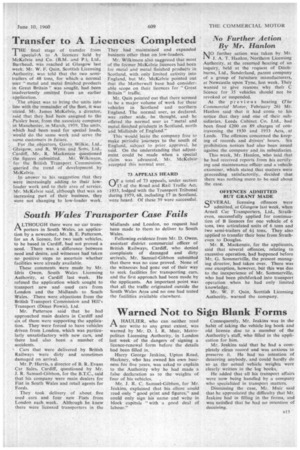South Wales Transporter Case Fails
Page 49

If you've noticed an error in this article please click here to report it so we can fix it.
A LTHOUGH there were no car trans1-71 porters in South Wales. an application by a newcomer, Mr. B. E. Patterson, for an A licence, for two such vehicles, to be based in Cardiff, had not proved a need. There was a difference between need and desire, and witnesses had taken no positive steps to ascertain whether facilities were already available. These comments were made by Mr. Idris Owen, South Wales Licensing Authority, at Cardiff last week. He refused the application which sought to transport new and used cars from London and the Midlands to South Wales. There were objections from the British Transport Commission and Hill's Transport (Dinas Powis), Ltd. Mr. Patterson said that he had approached main dealers in Cardiff and six of them were supporting the application. They were forced to have vehicles driven from London, which was particularly unsatisfactory with new cars, and there had also been a number of accidents. ••• Cars that were delivered by British Railways were dirty and sometimes damaged on arrival. Mr. P. Harris, a director of B. R. Evans Car Sales, Cardiff, questioned by Mr. J. R. Samuel-Gibbon, for the B.T.C., said that his company were main dealers for Fiat in South Wales and retail agents for Fords. They took delivery of about five used cars and four new Fiats from London each week. Although he knew there were licensed transporters in the Midlands and London, no request had been made to them to deliver to South Wales. Following evidence from Mr. D. Owen, assistant district commercial officer of British Railways, Cardiff, who denied complaints of damaged and dirty arrivals, Mr. Samuel-Gibbon submitted that there was no case proved. None of the witnesses had gone out of their way to seek facilities for transporting cars, and the first approach had been made by the applicants. An important point was that all the traffic originated outside the South Wales Area and no one had tested the facilities available elsewhere.




















































































































































